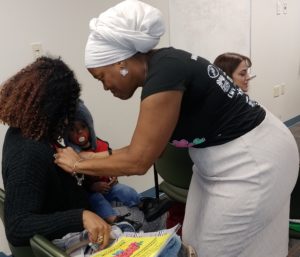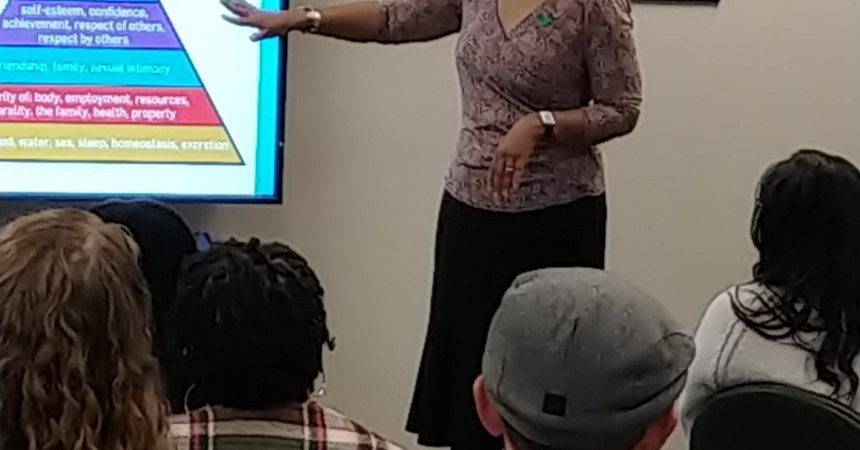Symposium focuses on youth mental health
By St. Clair Murraine
Outlook staff writer
In Austin Israel Davis’ family, there is nothing tabooed about having to deal with mental health. It’s a way of life for them.
Especially in the case of Austin, who is living with anxiety disorder and being autistic. He told his story, along with two other teenagers who gave testimonies at a youth symposium on mental health last Saturday at the Roberts and Stevens Clinic.

Dr. Yolanda Bogan, a licensed psychologist and associate team at FAMU’s College of Social Science, was keynote speaker at last Saturday’s Youth Symposium on Food and Hunger.
“What is easy for other people is difficult for me, but I don’t have that instinctive knowledge of what should be easy and what should not be,” Davis said. “To me it simply feels like I’m failing and since other people are not failing, obviously there is something wrong with me and that is absolutely not the case.
“I’m realizing more and more each day that I’m not built to do things in ways other people are. I can do the things but I either have to take a different route or set a different goal.”
Organizers of the symposium have been staging the event for nine years now. This one was intended to show the connection between food insecurities and mental health.
Community engagement is vital to correcting food insecurities and other mental health issue, said Dr. P. Qasimah Boston, a doctor of philosophy in public health and a professor in the Institute of Public Health at FAMU.
“We need a community-based approach to children’s mental health,” Boston said. “We have the agency approach, the academic approach but we don’t have the community-based approach where you are going and talking with communities specifically and addressing and telling the message to communities specifically.
“So what happening is that they’re not given the messages that they need to have in order to recognize potential needs for children’s mental health services.”

Dr. P. Qasimah Boston (right) assists Anita M. Whitby-Davis with pining on a symposium brooch.
Photos by St. Clair Murraine
That, however, isn’t the case with Davis’ family. He is a gifted Lincoln High School sophomore who will be taking college course in his senior year. His mother, Anita Whitby-Davis, is a staunch mental health advocate and has been active in his school.
Her mother identified Austin’s condition early, Whitby-Davis said, and the family has been “raising him in an environment where no one sees him as different.”
That has been helpful to Austin, but she recalled how he had one of his worst episodes of being in a non-verbal state in 2016. It started shortly after he was moved from Governor’s Charter to Lincoln High School and could no longer get individual education privileges.
Not long after, Austin family found him in a bathtub with his wrist slit. He’s recovered but has to take his classes at home, where a teacher gives him his assignments.
The kind of support that Austin is getting at home is essential to young people coping with mental health challenges, said Yolanda Bogan, a licensed psychologist who is associate dean of FAMU’s College of Social Science.
Throughout a condensed presentation, she outlined several ways to identify and cope with mental health, including when an individual should know to trust their gut feelings.
In part, she said, individuals should “allow ourselves the time to focus on our inner desires and ideas about how we are moving through this world with other people with ourselves; spiritually, emotionally, socially. Having the time to reflect on that allows us time to get in tuned with our own spiritual self or our gut.”
Most of the early portion of the symposium featured children after a drum call by Beyah Kareem. One of the more compelling features by the children was a skit that illustrated how some parents miss the signs of mental illness.
For example, there was a scene of a child lamenting about going to school and the parent’s response was “get up and let’s go. I don’t have time for your nonsense.”
The point was driven home by a video that featured children saying “we are sending you signals every day.”
Some of those signals, Boston said, could be withdrawal from social activities with their friends or sleeping most of the day.
Thomas Lomack responded to that during a question and answer session that followed a breakout group discussion saying, “Children want guidance, but we don’t give it to them.”
City Commissioner Curtis Richardson, who presented a proclamation to the organizers, said the event was a good starting point for getting young people’s attention.
“It is important that our young people understand these issues because they would have to be a part of the solution,” Richardson said. “We need to start getting them involved early, understanding what these issues are and how they impact our communities and what things could be done to remedy all of this.”









